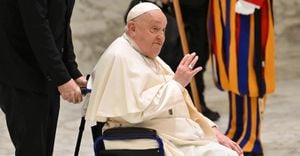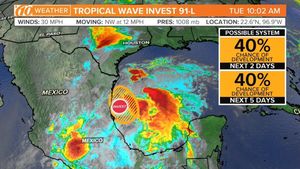Israel successfully secured the release of six hostages from Hamas captivity on Saturday, culminating years of anguish for their families. The freed individuals include Eliya Cohen, Avera Mengistu, Hisham al-Sayed, Omer Shem Tov, Tal Shoham, and Omer Wenkert—all of whom endured varying lengths of captivity under dire conditions.
This notable event is tied to the alarming backdrop of events beginning with the Hamas-led massacre on October 7, 2023, when militants stormed southern Israel, killing approximately 1,200 people and taking 251 hostages.
Among the released hostages, Eliya Cohen, 27, was captured during the tragic Supernova music festival, where he had attended with loved ones and witnessed horrifying violence. “We are overwhelmed with emotion and gratitude for Eliya’s return home after 505 long and torturous days in captivity,” his family expressed. They thanked the Israeli Defense Forces (IDF) and the nation for their unwavering support throughout the painful ordeal.
Also released was Omer Shem Tov, 22, known for his joy and talent, who was abducted from the same festival. His family highlighted his struggle with celiac disease during captivity and thanked those involved for their persistent hope and efforts. “We still don’t know everything—the horror stories will only be revealed with time. But now, we can hug him again,” they stated.
Tal Shoham, 40, and Omer Wenkert, 23, both residents of Israel, also faced similar fates, taken captive during the brutal attack. The families made poignant calls for the government to secure the release of all remaining hostages still held by Hamas.
Avera Mengistu and Hisham al-Sayed, the two longest-held hostages, were released after spending over ten years each under Hamas control. Mengistu, originally from Ethiopia, crossed the border to Gaza due to mental health challenges, and his family had endured unprecedented distress waiting for his return. “Our family has endured ten years and five months of unimaginable suffering,” they stated, reflecting upon their efforts to secure his release. Images of their reunion at Ichilov Hospital showed emotional scenes of relief and gratitude.
Similarly, Hisham al-Sayed, 36, had crossed the border under comparable circumstances and spent years unaccounted for. His father, Shaaban al-Sayed, expressed immense sorrow over the years lost, emphasizing, “Why were they holding someone like this who did nothing wrong?”
The recent hostages' release coincided with Israel’s decision to free 602 Palestinian prisoners, which included numerous individuals serving long sentences for various offenses. Reports indicate more than 100 of the released Palestinian prisoners will be deported.
Throughout the negotiations, families of all the hostages had consistently voiced their hopes for the safe return of their loved ones. Mengistu’s family expressed the need for privacy and peace following their long ordeal, hoping to seize the moment to work toward bringing remaining captives home with urgency.
While celebrations unfolded upon the return of these individuals, there are still numerous hostages unaccounted for, creating continued tension amid the reinstated brutality of conflict. Negotiations are expected to continue, with families urging the Israeli government to prioritize efforts for swift resolutions.
The emotive tone of the reunions is overshadowed by the reality of the lives affected. Omer Shem Tov’s family articulated their acknowledgment of the complication of their loved ones’ experiences, indicating: “Thank you to the Creator, to the people of Israel for their prayers, strength, and love.”
Now, the hope remains steadfast for the remaining hostages—both Israeli and Palestinian—to see their families again. Amid continued calls from family members for action, the Israeli military reaffirmed its commitment to saluting the returning hostages, “embracing them as they make their way home.”
While the emotional journeys of these families embody resilience and human connection, they also highlight the pressing need for continued dialogue and action to resolve the larger conflict.



